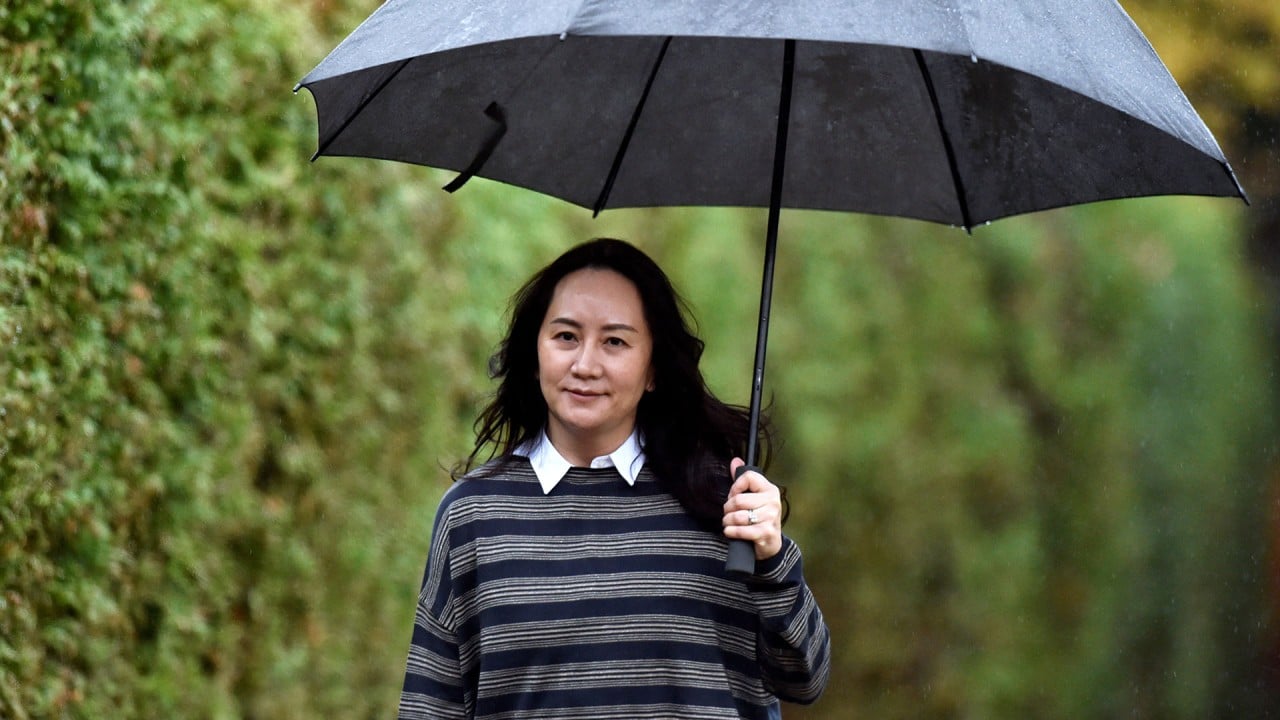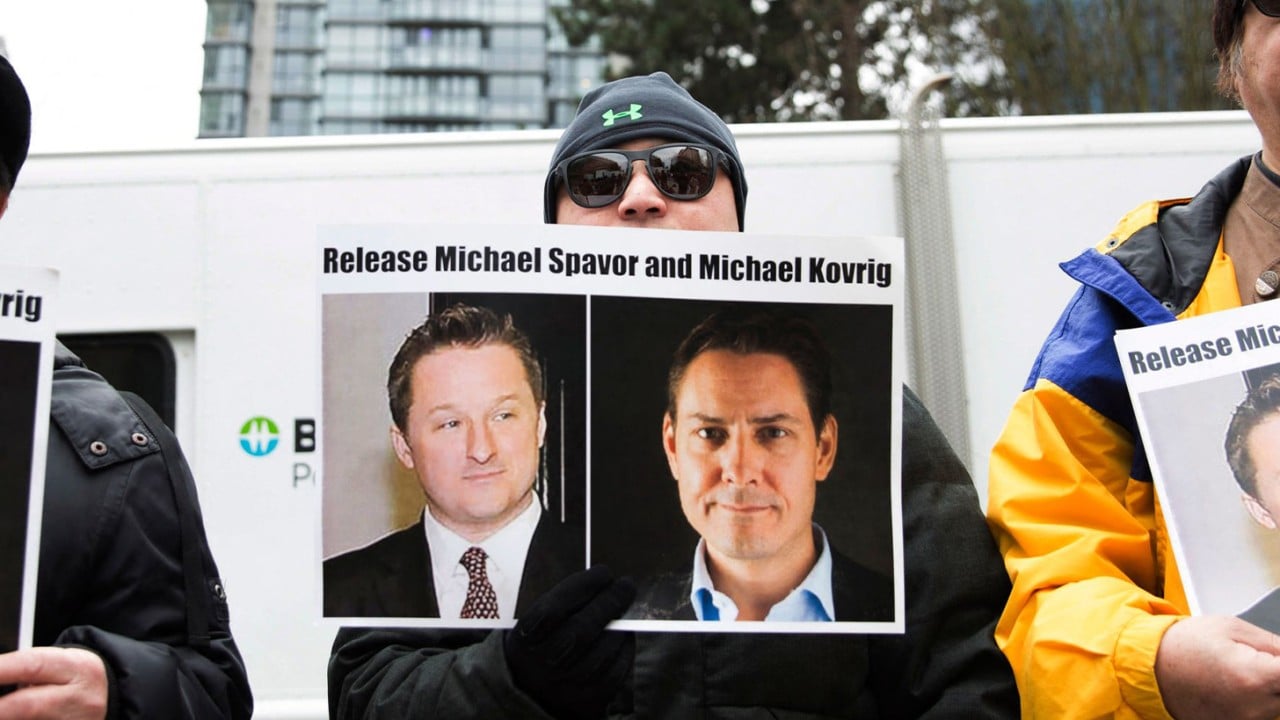
Canada had to arrest Meng Wanzhou and it was not arbitrary, but detention is now unlawful, her lawyer says
- Lawyer Gib van Ert’s comments at extradition hearing are in contrast with the position of China’s government about Huawei executive’s 2018 arrest
- Meng’s lawyer presented reports suggesting the basis for US charges, relating to transactions by foreign entities, was unlawful overreach
Lawyer Gib van Ert said Meng’s detention on a US fraud warrant was not arbitrary, a position in contrast to repeated assertions otherwise by China’s government.
“Canada had to detain Ms Meng, having received what was, on its face, a bona fide extradition request. We were bound by our treaty obligations to take seriously the US claims, to take the steps needed to detain Ms Meng pending the determination of her extradition,” he said.
“We had to do those things and we did them and there’s nothing about that that is an arbitrary detention. But we nevertheless say that it is now revealed to be an unlawful detention.”

Van Ert told Associate Chief Justice Heather Holmes of the Supreme Court of British Columbia that she could not avoid ruling on whether the US had jurisdiction over Meng by referring the matter to Canada’s justice minister.
“If this extradition request is, as we say, contrary to international law, the consequence of that is that Ms Meng’s detention is unlawful … that’s not a matter you can leave to the minister. That’s a matter that you have to see to my lady,” he said.
Van Ert said accepting the basis for the US charges against Meng that related to conduct in Hong Kong was “tantamount to accepting a limitless US jurisdiction”.
Canada judge ‘must rule’ if US jurisdiction covers Meng’s Hong Kong actions
He guided Holmes through a series of expert opinions that were intended to depict the US as engaged in overreach by having justified its jurisdiction on so-called “dollar clearing” transactions in US currency.
The US “uses these transactions as a basis to extend its jurisdiction … beyond lawful limits”, said van Ert.
Meng is accused of defrauding HSBC by lying to the bank during a 2013 meeting about Huawei’s business dealings in Iran, thus putting the bank at risk of breaching US sanctions on the Middle East country.
But Meng is Chinese, HSBC is British, and the meeting took place in a Hong Kong teahouse. Van Ert has told the court that the US therefore has no jurisdiction over Meng’s alleged conduct that day.

04:43
How the arrest of Huawei CFO Meng Wanzhou soured China's relations with the US and Canada
Van Ert said the US assertion of jurisdiction relies upon the dollar-clearing process, in which US dollar transfers between two non-US bank accounts may pass through their respective correspondent US banks. The accusations against Meng cite about US$2 million in transfers between Huawei affiliate Skycom and a British company called Networkers.
The lawyer said the transactions amounted to a British company paying a Chinese company for services in Iran, a process that would have had no connection to the US at all had the transaction been paid, say, in cash in Britain. “We wouldn’t be here,” said van Ert, and the claimed connection of the transactions to the US was “at best incidental”, even leaving aside whether they could then be connected to Meng.
He cited US law professor William Dodge, a former international law counsellor to the US State Department, who wrote in an affidavit: “Territorial jurisdiction cannot support the application of US bank fraud, wire fraud, and conspiracy statutes when none of the conduct occurred in the United States.”
Dutch international law professor Cedric Ryngaert meanwhile wrote that the US exercising of jurisdiction over the routing of payments through US correspondent banks “regardless of the extraterritorial nature of the underlying transaction and the persons involved … is contrary to the genuine connection requirement under international law.”
Ryngaert said in his affidavit that such a jurisdictional claim was “tenuous”.
Meng’s Vancouver mansions are not owned in her name, extradition case hears
The issue of “US overreach based on dollar clearing”, regarding its sanctions regime, had been identified by academics for years, said van Ert.
“If it has it in Hong Kong, it has it anywhere in the world,” van Ert asserted of US jurisdiction.
He cited French law professor Regis Bismuth who wrote in an affidavit that the essence of US claims of correspondent-account jurisdiction “is in reality to serve as a jurisdictional proxy for the US to de facto regulate the use of its currency abroad and to extend its restrictions on transactions over which it cannot exercise its territorial or personal jurisdiction”.
However, van Ert told Holmes he was not asking her to rule on the lawfulness of US sanctions, just on the lawfulness of the request for Meng’s extradition to face trial in New York.
Canadian government lawyers representing US interests in the case say that the jurisdictional argument should not be dealt with by the BC court, and that it should be primarily left to the US trial to consider, as well as Canada’s justice minister, who ultimately would have to sign off on Meng’s extradition if Holmes approves it.

02:11
Second Canadian, Michael Kovrig, on trial behind closed doors in China on spying charges
The jurisdictional claims are the latest branch of an argument by Meng’s lawyers that she is the victim of an abuse of process that has been so “egregious” that the only remedy is for Holmes to free her.
The other branches are that Meng is the victim of a political prosecution brought to use as leverage in the US trade war with China, that Canadian police and border officers conducted a covert criminal investigation of Meng to help the American Federal Bureau of Investigation, and that US prosecutors provided the BC court with misleading summaries of their case against Meng.
Meng, 49, is Huawei’s chief financial officer and the eldest daughter of company founder Ren Zhengfei. Her arrest at Vancouver’s airport on December 1, 2018, at the request of the US, outraged China’s government and has thrown its relations with Canada and the US into turmoil for the past two years.
‘US laws do not apply in China’: new front opens in Meng extradition fight
Beijing has repeatedly depicted Meng as a victim of arbitrary detention.
In February, after Canada signed a declaration denouncing arbitrary detention of foreign citizens, Chinese foreign ministry spokeswoman Hua Chunying called Ottawa hypocritical.
“Canada’s so-called declaration looks more like a confession in which the Canadian side admits its mistake in the Meng Wanzhou case,” Hua had said. “On one hand, the Canadian side advocates that it adheres to the rule of law, but on the other hand, it acts as an accomplice of the US and arbitrarily detains Chinese citizens.”
On Wednesday, another of Meng’s lawyers, William Smart, said the extradition proceedings had had a “profound” effect on Meng and her family, as he called the US extradition request an “affront” that should be denied.
“She spent 10 or 11 days in jail, she’s been living under a form of house arrest for the past 27 months, away from her family and friends except when they are able to visit. Her life has been turned upside down,” Smart told the BC court.
“The publicity and scrutiny of her has been extraordinary, largely because she finds herself in the middle of a political struggle between the requesting state and her country. The requesting state is without jurisdiction. This entire extradition process is a misuse and abuse of this court’s process.”
Meng’s life would never be the same after her “ordeal”, Smart added.
Meng is living under partial house arrest in a C$13.7 million (US$10.9 million) mansion, one of two homes she owns in Vancouver, but she is free to travel around most of the city so long as she is accompanied by private guards, abides by a curfew, and wears a GPS tracker.
Days after Meng’s original detention, China arrested Canadians Michael Kovrig and Michael Spavor, accusing them of espionage. In the past two weeks, both underwent closed-door trials which only lasted a matter of hours; no verdicts have been announced.
Canada says they are victims of hostage diplomacy and arbitrary detention by China, in retaliation for Meng’s treatment.
Meng’s case was adjourned until Thursday, the last day in a three-week block of hearings. Her long extradition battle may be nearing its end, with a final three weeks of hearings scheduled to conclude on May 14 before Holmes retires to consider whether to free Meng or approve extradition and send the final decision to the justice minister.
But appeals could last for years.

